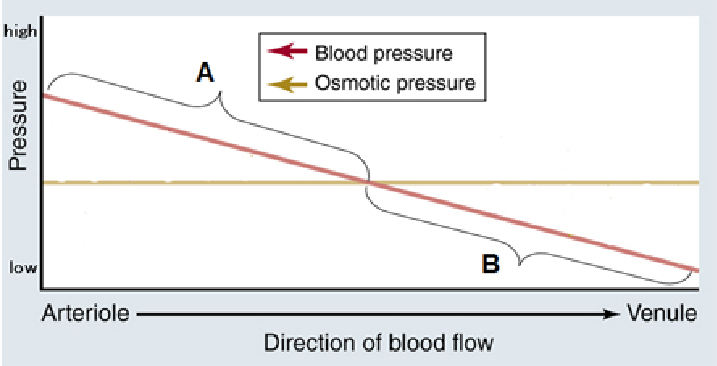Once nerve cells become mature, they do not typically undergo cell division. Based on your knowledge of the cell
cycle, you might predict that mature nerve cells become arrested in the ____ of the cell cycle.
a. G0 phase
b. S phase
c. prophase
d. G1 phase
e. G2 phase
a
You might also like to view...
The graph below can be used to understand the forces underlying the movement of fluid between the blood and the interstitial fluid. What is a true statement concerning these processes?

A. Normally, the net amount of fluid flow in region A is less than the net amount of fluid flow in region B.
B. Sodium ions contribute significantly to the movement of fluid in region B.
C. Fluid leaves the blood in region A and returns to the blood in region B.
D. In people suffering from severe liver disease or protein starvation, the fluid flow in region B is increased.
E. Edema results from reduction of fluid flow in region A.
Clarify Question
What is the key concept addressed by the question?
What type of thinking is required?
Gather Content
What do you already know about the movement of materials in and out of the circulatory system? What other information is related to the question?
Choose Answer
Given what you now know, what information is most likely to produce the correct answer?
Reflect on Process
Did your problem-solving process lead you to the correct answer? If not, where did the process break down or lead you astray? How can you revise your approach to produce a more desirable result?
The physical units of heredity composed of defined DNA sequences that collectively control gene transcription and contain the information to produce RNA molecules or proteins are better known as what?
What will be an ideal response?
Which parts belong to the central nervous system?
A) sensory neurons B) interneurons C) motor neurons D) effectors
Why is territoriality an adaptive behavior for songbirds maintaining populations at or near their carrying capacity?
A) Songbirds expend a tremendous amount of energy defending territories so that they spend less time feeding their young and fledgling mortality increases. B) Only the fittest males defend territories and they attract the fittest females so the best genes are conveyed to the next generation. C) Songbird males defend territories commensurate with the size from which they can derive adequate resources for themselves, their mate, and their chicks. D) Many individuals are killed in the ritualistic conflicts that go along with territorial defense. E) Songbirds make improvements to the territories they inhabit so that they can all enjoy larger clutches and successfully fledged chicks.